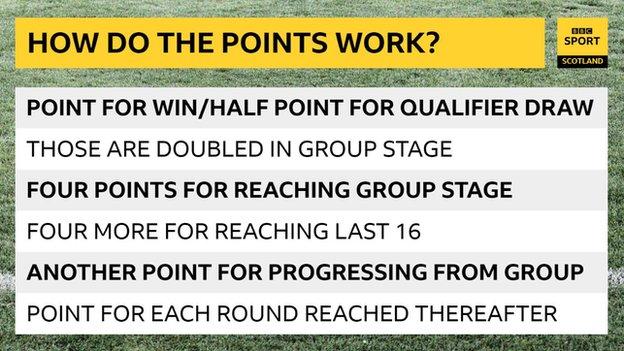
Amid the shock and bemusement at Kilmarnock's humiliating exit from the Europa League, another noise could be heard - that of Scottish football fans bemoaning the damage the defeat at the hands of Welsh part-timers Connah's Quay Nomads would have on the coefficient.
Uefa ranks nations and attributes places in the Champions and Europa League based on the points earned each season. So teams going out early - often at the hands of underwhelming opposition - is the reason why Scottish Premiership sides find themselves playing qualifiers in early July with the group stages a very distant prospect.
But how bad is Scotland's standing in Europe? How can we improve our lot? And are extra European places on the horizon?
Better than it did. From a high point of 10th in 2005, Scotland had tumbled further than any other nation in the Uefa rankings before bottoming out in 26th position at the start of last season.
A much-improved campaign last year - with both Celtic and Rangers competing in the Europa League group stages - earned the nation's biggest points haul for 11 years of 6.75 and has bumped Scotland back up to 20th, above the likes of Sweden, Poland and Belarus. In fact, just one more draw by one of the four entrants would have seen the country overtake Serbia and clinch 19th place.
This term has started strongly, too, with Celtic, Rangers, Kilmarnock and Aberdeen winning seven of their eight matches so far, with the Rugby Park side's shock defeat the only blemish. That means 1.750 points are already on the ledger - the most of any nation whose teams have played qualifiers so far.
And while Scotland have already lost one of their four representatives, so too have Croatia and Serbia, who sit above them.
By maintaining the success of last season and having two teams in the group stages of the two competitions every season.
While Aberdeen were knocked out in their first Europa League tie - against Burnley - Hibernian progressed through two rounds of the competition, while both Rangers and Celtic reached the group stages, with the latter making it to the last 32.
With the total points earned divided by the number of teams from a country competing, that proved enough to earn 6.75 coefficient points - a tally bettered only by nine nations.

The real target is moving up to 15th place - the point at which an extra Champions League qualifying place is on offer.
Next term, Croatia will have two teams in the continent's premier club competition and at the start of this campaign they sat a little over 10 points ahead of Scotland. Bridging that gap in one season is unfeasible, but maintaining a higher average of points over the next few seasons may well allow Scotland to gradually reel in the seven nations above them.
Over the past five seasons, Scotland has averaged 4.43 points. Croatia have hit 5.48. That is the target.
There is. The Europa League 2 (UEL2) will start in season 2021/22 which will debar Scottish clubs from the current Europa League unless they can get into the top 15 of the rankings.
The Premiership title winners will still earn a place in the Champions League qualifiers, but the three other European entrants would go into this new third tier competition, which will be played on Thursdays alongside the existing Europa League.
As it stands, the seventh-placed teams in La Liga, the Premier League, Serie A and Bundesliga would all feature, as well as the sixth-placed team in France, and the clubs finishing fourth and fifth in Portugal.
The only way to get promoted from UEL2 is to win the thing, so getting up into the top 15 of the coefficient rankings is the only way to get into the Europa League, with the 15th-placed nation getting two Champions League berths, one Europa League entrant, and two more places in the new competition.